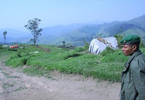
A powerful statement out today from Human Rights Watch shines the spotlight on deplorable crimes perpetrated against civilians by armed groups throughout the eastern Democratic Republic of the Congo. Notably, the statement describes in detail the “significant” uptick in violence in the wake of largely unsuccessful military operations against the rebel groups the LRA and FDLR and features an important quote from HRW Executive Director Ken Roth, who takes the United Nations to task for their support of the Congolese army, known as the FARDC:
UN peacekeepers should not support Congolese armed forces that are committing war crimes and failing to protect civilians and refugees, (…) By continuing to back such military operations, the peacekeepers risk becoming complicit in abuses.
No doubt in anticipation of the Human Right Watch report, Alan Doss, the head of MONUC, the U.N. mission in eastern Congo, wrote a letter to the editor that appeared in today’s Washington Post. Doss discusses the necessity of addressing mounting FDLR atrocities and implicitly defends MONUC’s support of the Congolese army while simultaneously calling for international efforts to professionalize the force:
The reprisal raids by the Hutu rebels of the FDLR have understandably created a lot of concern. But doing nothing is not a recipe for lasting peace either. Time and again the FDLR and other armed groups in eastern Congo have unleashed violence in the country and provoked conflict with neighboring states. Women and children have been the principal victims…We shall assess and adjust our support for joint operations with the Congo’s military forces to ensure that such operations are conducted in accordance with international humanitarian law.
Doss takes pains to discuss atrocities committed against civilians, but his argument belies the realities of FARDC atrocities. Currently, the United Nations is supplying logistical support to the army for a three-month operation to rout out the FDLR in the Kivus region of eastern Congo. However, government soldiers meant to protect civilians from predatory groups are among the worst perpetrators of violence. War criminals, such as former rebel commander and ICC indictee Bosco Ntaganda, sit in positions of power within the army. Unpaid soldiers wreak violent havoc on communities. Furthermore, many soldiers have a history of working with the FDLR rebels they are attempting to combat, and benefit themselves from the illicit minerals trade that fuels the conflict.
While Doss is right that removing the FDLR from eastern Congo is critical, the international community and the United Nations specifically have to do better at ensuring that civilians are protected as those efforts are undertaken. That means ensuring soldier pay and training, and working to develop a better strategy to combat the FDLR that emphasizes the encouragement of FDLR defections. As my colleagues Colin Thomas-Jensen and Rebecca Feeley recently noted on the Huffington Post, in its current form, the operation will lead to “more atrocities against Congolese civilians, create greater numbers of displaced and desperate people, and, because of the U.N.’s involvement, do lasting damage to the efficacy of U.N. peacekeeping.”
Victoria Bosselman contributed to this post.

